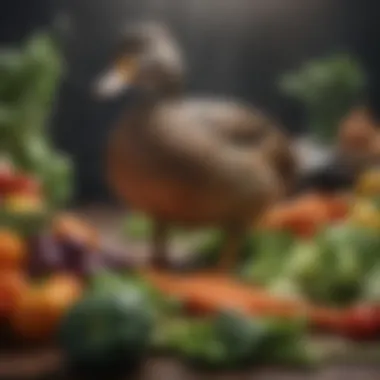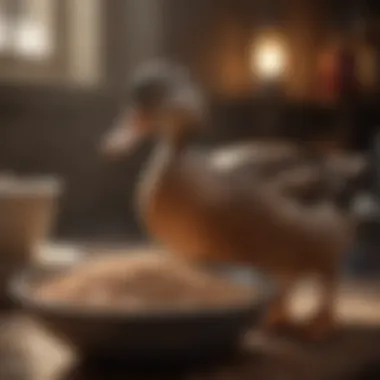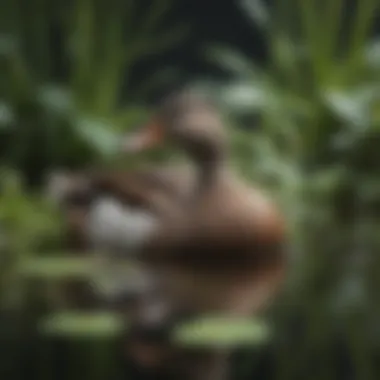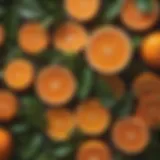Discover the Best Diet for Your Ducks: A Complete Feeding Guide


Animal Species Profile
Ducks are truly fascinating creatures with unique characteristics that set them apart from other avian species. Their physical appearance is distinct, featuring webbed feet ideal for swimming and a water-repellent coat of feathers. Ducks can be found in various habitats around the world, from freshwater lakes to marshes and rivers. Their behavior is intriguing, as they display social interactions within their flocks, communicating through quacks and body language.
What Ducks Eat
Ducks are omnivorous creatures, meaning they have a diverse diet consisting of both plant matter and small animals. Their natural diet includes aquatic plants, seeds, insects, and even small fish. As conscientious duck owners, it is crucial to replicate this varied diet in captivity to ensure their nutritional needs are met. Providing a balanced mix of commercial duck feed, vegetables, grains, and occasional protein sources like mealworms or shrimp can help maintain their health and vitality.
Nutritional Requirements
Understanding the nutritional requirements of ducks is vital for their well-being. Ducks require a diet rich in protein for muscle development and energy, along with essential vitamins and minerals to support their overall health. Balancing their diet with the right combination of carbohydrates, fats, and proteins is essential. Consultation with a veterinarian or avian nutritionist can help tailor a diet plan suitable for your ducks based on factors like age, breed, and activity level.
Dietary Considerations
When planning the diet for your ducks, certain considerations must be taken into account to ensure their health and happiness. Avoid feeding ducks bread, as it lacks essential nutrients and can lead to nutritional deficiencies. Incorporate leafy greens, vegetables, and fruits into their diet to provide vitamins and minerals. Additionally, offering fresh, clean water for drinking and bathing is crucial for their hydration and hygiene.
Conclusion
Understanding Duck Nutrition
Ducks, like any living being, require a well-balanced diet to thrive. Understanding Duck Nutrition is pivotal for duck owners to ensure the health and well-being of their feathered companions. By grasping the essential components of a duck's nutritional needs, owners can tailor their diet accordingly, promoting optimal growth, development, and vitality.
Basic Nutritional Needs
- Protein: Protein plays a critical role in a duck's diet, essential for muscle development, feather growth, and overall health. Ducks require an adequate amount of protein to maintain their bodily functions and sustain their active lifestyle. Incorporating protein-rich foods into their diet is crucial for ensuring they receive the necessary amino acids for growth and repair.
- Carbohydrates: Carbohydrates act as a vital energy source for ducks, providing the fuel needed for their daily activities. They aid in digestion and serve as a quick energy boost for ducks, especially during strenuous activities like foraging and swimming. Balancing the intake of carbohydrates is key to meeting the energy demands of ducks without causing nutritional imbalances.
- Vitamins and Minerals: Ducks need a variety of vitamins and minerals to support their immune system, promote proper growth, and maintain overall health. From vitamin A for vision health to calcium for strong bones, these micronutrients are essential for ensuring ducks lead a vibrant and healthy life. Supplementing their diet with a diverse range of fruits, vegetables, and supplements can help meet their micronutrient requirements.


Dietary Considerations
- Age-specific Requirements: The nutritional needs of ducks vary depending on their age. Ducklings have higher protein requirements for growth and development, while adult ducks may need a more balanced diet to sustain their energy levels and health. Understanding age-specific requirements helps tailor the feeding regimen to meet different life stages' demands.
- Special Dietary Needs: Some ducks may have special dietary needs due to health conditions or specific requirements. Providing a custom diet to address these unique needs ensures their well-being and quality of life. Whether it's a low-protein diet for kidney health or high-fiber foods for digestive issues, accommodating special dietary needs is crucial in maintaining optimal health for ducks.
Common Foods for Ducks
Feeding ducks is a crucial aspect of caring for these delightful creatures. In this comprehensive guide for duck owners, understanding the significance of common foods for ducks is paramount. Common foods ensure that ducks receive a well-rounded diet that meets their nutritional requirements while keeping them healthy and thriving. From commercial duck feed to fresh vegetables and fruits, offering a variety of foods allows duck owners to cater to their pets' diverse dietary needs.
Commercial Duck Feed
When it comes to commercial duck feed, two common options are pellets and crumbles. Pellets are densely packed feed particles that provide essential nutrients in a compact form, making them convenient for duck owners to administer. The key characteristic of pellets lies in their balanced formulation, ensuring ducks receive the required protein, vitamins, and minerals for optimal health. While pellets offer ease of use and complete nutrition, some owners may find that they limit the natural foraging behavior of ducks. Crumbles, on the other hand, are smaller-sized particles that are easier for ducks to consume, especially young or smaller ducks. Their uniform texture prevents selective feeding, ensuring that ducks receive a well-rounded diet. Despite their benefits, crumbles may lack the variety of nutrients found in whole foods, necessitating supplementing with other food sources to meet ducks' nutritional needs.
Vegetables and Fruits
Including vegetables and fruits in a duck's diet adds a colorful assortment of nutrients and flavors. Leafy greens such as kale and spinach are rich in essential vitamins and minerals, contributing to ducks' overall health. Offering a mix of different leafy greens provides variety and ensures a balanced intake of nutrients. Peas and corn are other popular vegetable choices, packed with energy-rich carbohydrates that power ducks through their daily activities. These vegetables are easy to digest and provide a tasty treat for ducks. Berries are a delightful addition to a duck's diet, offering antioxidants and natural sweetness. While berries should be given in moderation due to their sugar content, they are a flavorful and nutritious snack that ducks enjoy.
Insects and Grains
Insects and grains are natural food sources that mimic the diet of ducks in the wild. Mealworms are rich in protein and are highly prized by ducks for their crunchy texture. These wriggly treats satisfy ducks' foraging instincts while offering a protein boost to support muscle growth and maintenance. Rice is a common grain that ducks readily consume. Whether cooked or uncooked, rice provides carbohydrates for energy and is easily digestible for ducks. While grains like rice are a good source of energy, it is essential to offer a balanced diet that includes a variety of foods to ensure ducks receive all the necessary nutrients for their well-being.
Foods to Avoid
Understanding the importance of avoiding certain foods in the diet of ducks is crucial for maintaining their health and well-being. By being aware of toxic and processed foods, duck owners can prevent potential harm and ensure a balanced diet for their feathered friends.
Toxic Foods


Chocolate
Chocolate is one of the toxic foods for ducks and should be strictly avoided in their diet. Despite its popularity among humans, chocolate contains theobromine, which can be harmful to ducks leading to various health issues. The unique feature of chocolate lies in its rich taste and allure to many, but its detrimental effects on duck health cannot be overlooked when considering suitable food choices.
Avocado
Another food to avoid feeding ducks is avocado. Avocados contain a substance called persin, which is toxic to birds like ducks. While avocados are well-regarded for their nutritional content in human diets, they pose a risk to duck health due to their toxicity. Duck owners should understand this unique feature of avocados and be cautious to prevent any potential harm to their ducks.
Onions
Onions are known to be toxic to ducks and should be kept away from their diet. Onions contain compounds that can lead to oxidative damage in red blood cells, affecting the overall health of ducks. Despite being a common kitchen ingredient, the dangers of onions for ducks highlight the need for informed dietary choices to prevent any adverse effects on their well-being.
Processed Foods
In addition to toxic foods, duck owners should also steer clear of processed foods that may not offer the necessary nutrition for ducks. Processed foods like bread and chips are often high in salt, sugar, and preservatives, which can be harmful to ducks when consumed regularly. While bread might be convenient as a snack, its lack of essential nutrients makes it a less than ideal choice for duck diets. Similarly, chips are high in unhealthy fats and additives, making them unsuitable for sustaining duck health. Duck owners should prioritize natural and wholesome food options to ensure the optimal well-being of their feathered companions.
Feeding Practices and Tips
Feeding practices and tips are pivotal in ensuring the optimal health and well-being of your ducks. This section sheds light on the essential elements that every duck owner should consider when planning their feeding regimen. By emphasizing factors like feeding schedule, portion control, and water source, duck enthusiasts can elevate their understanding of how to nurture their feathered companions effectively.
Frequency of Feeding
Frequency of feeding plays a fundamental role in maintaining the vitality of ducks. Establishing a consistent feeding schedule not only regulates their nutritional intake but also promotes healthy eating habits. Ducks thrive on routine, so providing regular meals ensures their digestive system functions efficiently. Understanding the specific needs of your ducks, such as their activity level and age, allows you to tailor a feeding frequency that suits their requirements. By monitoring their response to feeding times, you can fine-tune the schedule to optimize their overall health and energy levels.
Portion Control


Implementing portion control is crucial in preventing issues like obesity and nutrient imbalances in your ducks. By carefully measuring and distributing appropriate portion sizes, you can prevent overeating and maintain a healthy weight for your feathered friends. Portion control also enables you to track their food intake accurately, helping you identify any potential dietary concerns early on. While it's essential to offer sufficient food, moderation is key to preventing unnecessary strain on their organs and ensuring they receive a well-rounded diet. Adhering to portion control guidelines facilitates a balanced nutritional intake, contributing to the longevity and vitality of your beloved ducks.
Water Source
The quality of the water provided to ducks directly impacts their overall health and hydration. Clean water is essential for their well-being, as ducks not only drink it but also use it for various activities like preening and bathing. Maintaining a fresh water source free from contaminants is imperative to prevent infections and digestive issues in ducks. Hydrating properly aids in digestion and nutrient absorption, further highlighting the significance of a reliable water source in their daily routine.
Avoiding Contamination
Avoiding contamination of the water source is paramount in safeguarding the health of your ducks. Contaminants like chemicals, algae, or bacteria can jeopardize their well-being and lead to serious illnesses. Regularly cleaning water containers and ensuring that the source remains free from debris and pollutants is essential for promoting optimal health in ducks. Careful vigilance and proactive measures to prevent contamination not only protect your ducks from potential harm but also contribute to a hygienic environment essential for their thriving existence.
Consulting a Vet
Consulting a vet plays a crucial role in ensuring the overall health and well-being of your ducks. Ducks, like any other animals, require proper care and attention when it comes to their dietary needs. By consulting a vet specialized in avian nutrition, you can receive expert advice tailored to your duck's specific requirements. Vets can assess your ducks' health, identify any nutritional deficiencies, and recommend suitable diet plans. Through regular consultations, you can stay informed about the best feeding practices, potential health issues, and preventive measures for your ducks.
Signs of Nutritional Deficiencies
Lethargy
Lethargy is a common sign of nutritional deficiencies in ducks. It manifests as a lack of energy, decreased activity levels, and a general sense of fatigue. Ducks experiencing lethargy may appear sluggish, show disinterest in their surroundings, and have reduced appetite. Detecting lethargy early on is vital to address underlying nutritional imbalances promptly. By observing your ducks' behavior closely, you can identify signs of lethargy and seek timely veterinary intervention to prevent any adverse effects on their health.
Abnormal Feathers
Abnormal feathers can indicate underlying nutritional deficiencies in ducks. Feathers are essential for regulating body temperature, providing insulation, and facilitating flight. Nutrient deficiencies can lead to dull, malformed, or brittle feathers in ducks. By recognizing changes in feather quality, such as loss of luster or improper growth patterns, you can gauge your ducks' nutritional status and adjust their diet accordingly. Consulting a vet for thorough examination and personalized dietary recommendations can help restore your ducks' plumage and overall health.
Customized Diet Plans
Health Conditions
Considering the health conditions of your ducks is crucial in designing customized diet plans. Ducks may encounter various health issues that impact their nutritional requirements, digestion, and metabolism. Common health conditions in ducks include gastrointestinal issues, respiratory infections, and metabolic disorders. Tailoring diet plans to address specific health concerns can optimize your ducks' well-being and support their recovery process. Vet consultation allows for in-depth evaluation of your ducks' health status and the development of targeted dietary strategies to improve their overall health.
Weight Management
Effective weight management is essential for maintaining your ducks' health and mobility. Obesity or underweight conditions can predispose ducks to various health complications, affecting their quality of life. Customized diet plans should prioritize achieving and maintaining an ideal body condition score for your ducks. By monitoring their weight regularly and adjusting food portions as needed, you can prevent weight-related issues and promote their long-term health. Vets can provide guidance on individualized weight management strategies and monitor your ducks' progress towards achieving optimal body condition.







